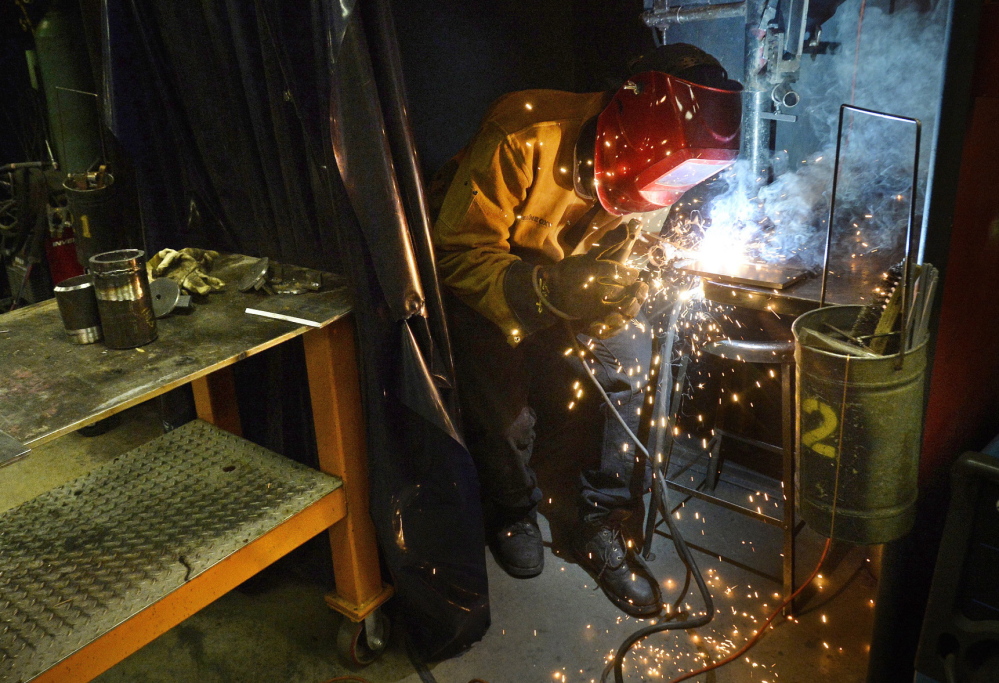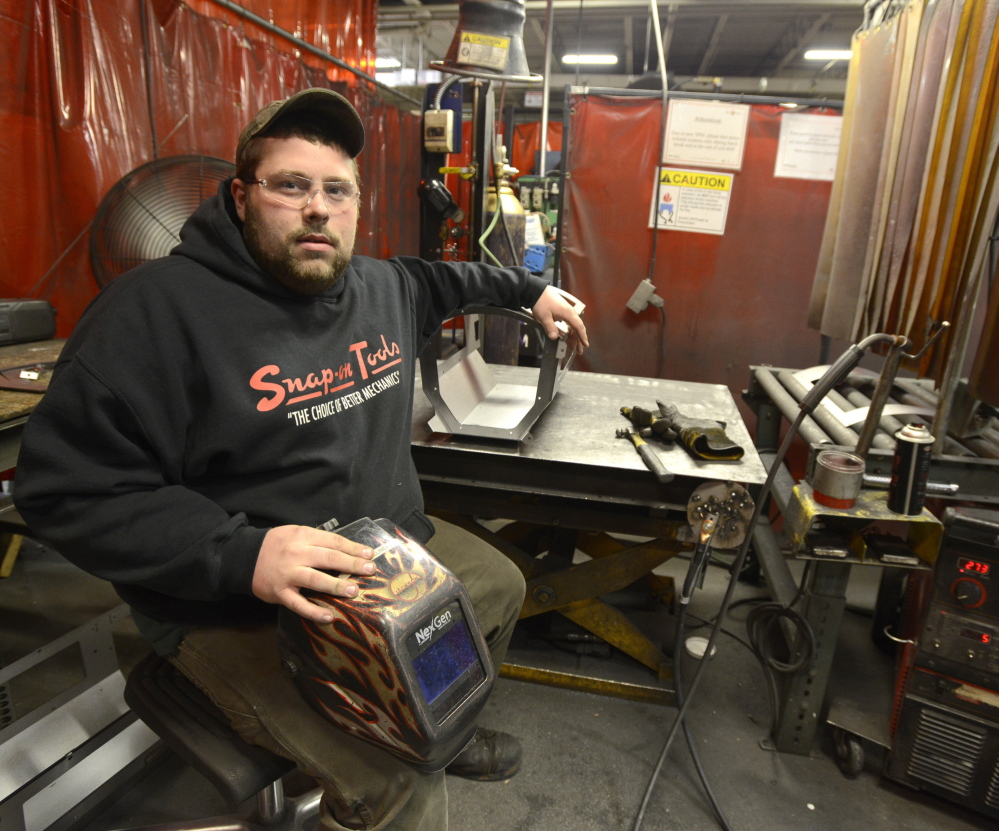SOUTH PORTLAND — Southern Maine Community College will eliminate three academic programs at the end of the semester in May, including several welding classes that employers say have been integral to providing skilled workers for construction and manufacturing jobs.
Not enough of the welding students were completing the one-year certificate program or a two-year associate degree to make the program viable, said Janet Sortor, vice president and dean of academic affairs at SMCC.
The college also is eliminating its degree program in medical health information technology, which was funded through a federal grant. Administrators said too few graduates found work in the narrow field and the grant money ran out.
A small but costly radiation therapy degree program is also being eliminated, and converted into a certificate program in advanced radiography, an area of continued job growth in the state.
The radiation therapy program drew about a dozen students every two years, with about half completing the degree. It cost the college nearly $145,000 per year to keep the classes going, while the tuition from students in the program covered only about $24,000.
“These things are never easy,” Sortor said. “We’re trying to conserve our limited resources, so we often look at benchmarks.”
The cuts will save the college about $250,000. State aid to community colleges, distributed on a per-pupil basis, is down 45 percent since Maine’s community college system was created in 2004.
SMCC officials said the degree program in welding no longer made sense. In the four academic years from the of fall 2008 to the spring of 2012, 80 students entered the welding degree and certificate program and only 15 completed either credential within three years, Sortor said.
The welding instructor, Mark Legel, will lose his job in May after 10 years at the college.
He said that, to get the academically accredited certificate in welding, students had to take other classes, such as math and English, where some of his top welders struggled. They abandoned the program in favor of high-paying jobs for which degrees aren’t required.
Many employers require only skills-based certifications developed by the American Society of Welders for specific welding techniques, which employers often use to determine whether someone is qualified.
“The students don’t want the baggage of getting a college certificate or a college associate’s degree,” Sortor said, despite SMCC’s mission of educating well-rounded people. “They just want to learn to weld, and we can’t do that in an academic credential.”
RETIRING WELDERS CREATING NEED
The need for welders is expected to grow in the coming years, as the previous generation of skilled workers looks toward retirement, said Warren Swan, welding director at the New England School of Metalwork in Auburn.
The average age of a professional welder in the United States is about 55, Swan said, accentuating the need for programs that cultivate new tradesmen.
“Years ago, everyone had a shop class,” Swan said. “It’s kind of a compounding issue. We’re not producing enough graduates to fill the spots opened up by people who are retiring.”
Swan said he can empathize with SMCC’s financial position. Even though the New England School of Metalwork is doing well, costs are a constant concern.
Welding on an industrial scale requires expensive machines that often need repairs. Steel isn’t cheap, and students constantly need materials for practice, as well as filler rods, welding wire, power tools for grinding and shaping metal, and the high-pressure bottles of inert gas required for some welding processes.
Legel said he believes that SMCC’s decision represents a failure by the administration to find a way for the welding program to work for both the college’s financial health and the students who need the program to acquire skills and get jobs.
DEGREE PROGRAM WELL-ROUNDED
On Tuesday afternoon, students in a welding class at SMCC were joining thick chunks of practice steel in the booths of the college’s welding shop.
Luke Buss, 20, of Manchester, Vt., said that before he enrolled, he didn’t know what he wanted to do, picking up construction jobs and working in a kitchen in his hometown. When a friend from high school signed up for the welding program, Buss decided to take his parents’ advice and followed his buddy to SMCC.
His friend dropped out of the program, but Buss stuck it out and is preparing to graduate in May with an associate degree in welding.
He has already been selected for a two-week internship at a fabrication and construction company near his hometown, where he is being brought on by a shop foreman who is a graduate of SMCC’s welding program. If he performs well, Buss said, he expects to land a job that pays about $20 an hour.
“Coming here was probably the best thing that’s ever happened to me,” he said. “I go back (home) and all my friends are basically still doing the same things.”
Buss realized that his English literature class might not apply directly to his trade, but he said other skills, such as writing, communicating and critical thinking, are important no matter what job he does.
Alex Dunklee, the shop foreman at Renaud Bros. in Vernon, Vt., the shop that is taking on Buss as an intern, said he wishes he had stayed the full two years at SMCC to learn more computer-aided drafting and other precision-machining skills, which the second half of the associate degree program offers.
Dunklee remembers groaning through his English class, but said he now sees the value of the broader curriculum.
“I think that’s part of the whole going-to-college thing,” he said. “It gives you a little bit of diversification. It helps you to be a better employee.”
To replace the program, SMCC administrators plan to offer non-credit welding courses taught by adjunct professors who can give the industry skills tests, said Julie Chase, interim dean of business and community partnerships.
WOOD STOVE BUSINESS DISPLEASED
One business disappointed by the program’s closure is Jotul, a Norwegian wood stove manufacturer with a plant in Gorham.
Since 2006, when the Gorham operation began producing stoves, SMCC instructor Legel has worked with Jotul officials to organize field trips to the company’s fabrication shop, exposing his students to new aspects of the trade while giving Jotul an up-close look at the school’s best students.
Scott Clinch, Jotul’s operations manager, said, “If we don’t have educational programs such as SMCC’s welding program that create ready labor pools, we’re in big trouble as a state (that) is trying to sustain and attract all kinds of businesses, including manufacturing.”
Chase said she has communicated with employers to determine how best to structure the non-credit offerings for the needs of companies that most often hire the welding students.
“If anything, we’re adding capacity to provide more short-term certifications,” Chase said. “There’s probably many things we can do to improve the non-credit options.”
Ryan Villineau went from studying in the SMCC program to working in Jotul’s shop. He completed the one-year certificate program and is now one of the company’s top employees, said Krista Irmischer, Jotul’s human resource director.
“I kind of screwed off in high school,” Villineau said.
He said that when he went to college, paying his own way, he knew he had to work harder.
“I decided I needed to step up to the plate,” he said.
Matt Byrne can be contacted at 791-6303 or at:
Twitter: MattByrnePPH
Send questions/comments to the editors.





Success. Please wait for the page to reload. If the page does not reload within 5 seconds, please refresh the page.
Enter your email and password to access comments.
Hi, to comment on stories you must . This profile is in addition to your subscription and website login.
Already have a commenting profile? .
Invalid username/password.
Please check your email to confirm and complete your registration.
Only subscribers are eligible to post comments. Please subscribe or login first for digital access. Here’s why.
Use the form below to reset your password. When you've submitted your account email, we will send an email with a reset code.